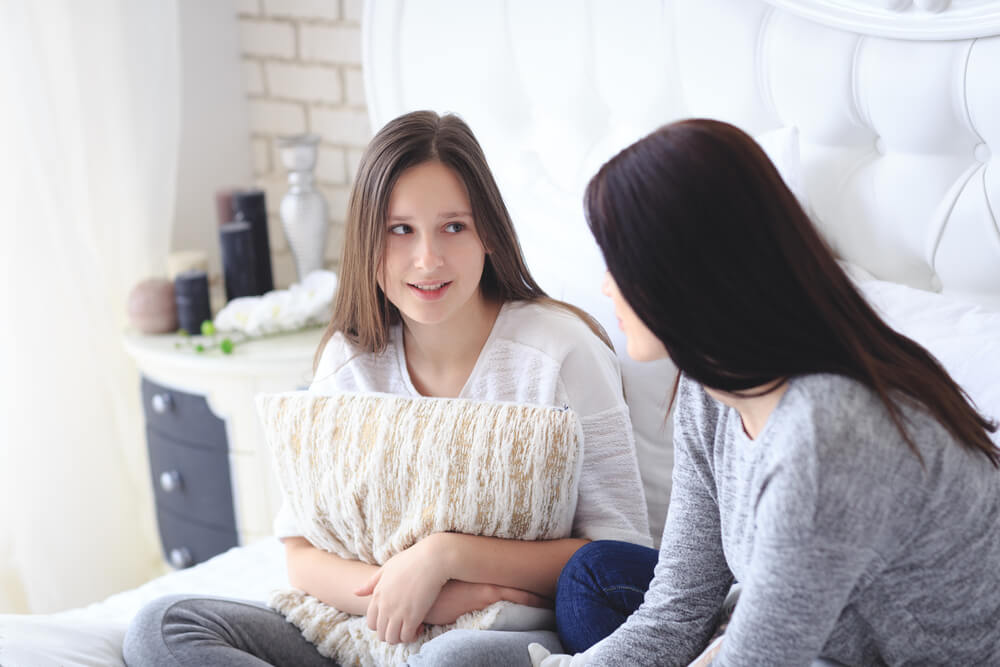Although menstrual cycles are a normal and natural part of every woman’s life, it is a new and undiscovered territory for teenage girls. If you have given birth to a girl, she will inevitably menstruate at some point in the future. According to gynecologists, it is better to have this discussion as early as possible so she can be ready when the time comes. By going into details about their bodies and internal processes that come as they age, you will help them understand everything better.
The main goal of such a conversation would be to help your teenage girl understand that getting a period is a normal, healthy thing and is nothing to worry about. Of course, do not hesitate to get in touch with us at University Park OBGYN if you need any tips on how to discuss this vulnerable subject with your daughter. Our gynecologist in Sarasota, FL, will gladly talk with her in a genuine, optimistic way to make this body change a positive experience. Here are some helpful guidelines you can use regarding the first period, ovulation, and PMS.
When Should I Talk With My Teenage Girl About This?

If your child hasn’t asked about this topic before, it is good to mention it to her as soon as you think she can understand the basic concept. There is no need to postpone this talk; discussing it as early as possible would help prevent any confusion later on. You can begin the conversation gradually and keep things general. Girls usually enter puberty around age 13, although it can happen earlier for some.
For example, if she sees your menstrual pad or tampon, that would be a great conversation starter. A good explanation would be that women bleed from their vaginas once per month, which is called menstruation. It doesn’t hurt, but it is a bit uncomfortable. Therefore, they need to wear pads or tampons to keep the blood away from their underwear. As she ages, you can start adding more details and explain terms like PMS and ovulation.
All girls will start noticing body changes as they enter puberty, such as hair growth, bigger breasts, and acne. Aside from those, the main and probably the scariest symptom for them would be getting a period, especially if they didn’t know about it beforehand. If she notices any of those signs, feel free to tell her everything else. Female bodies change with age to prepare for pregnancy. The place in which babies grow in a woman’s stomach is called the uterus. Every month, it sheds and bleeds a bit. That blood comes out of the vagina.
If your daughter has questions about this topic, be patient and give brief, understandable answers. It is normal for teenage girls to feel overwhelmed after hearing all those facts, so it is helpful to keep things as short and direct as possible.
What Should I Talk About With Her?
After you introduced her to the concept of menstrual cycles, it is time to go deeper and explain why this happens and what processes occur in female bodies during those times. A helpful tip would be to outline the most important things, such as menstrual supplies, hormones, PMS, period phases, etc.
Start by saying that girls usually get their first period between the ages of 10 and 15, the average being 12. If your daughter hasn’t gotten her menstruation yet, explain that it is perfectly normal. Every girl’s body functions differently. Although you can’t be sure when she will get her first period, there are some indications, such as breast growth and vaginal discharge. Tell her to keep an eye on any fluids on her underwear as it may indicate menstruation in the near future. It usually starts half a year before getting it.
After that, she needs to understand why periods happen, and the correct answer is hormones. You can show her a picture of the pelvic area and all reproductive organs. Ovaries release two hormones called estrogen and progesterone. These prepare the uterus for pregnancy every month by building it up; then, it is ready for a fertilized egg to bind and begin developing. If that doesn’t happen, the uterine wall sheds and bleeds. This process usually happens every month for the majority of girls and women.
It is also crucial for her to understand that her periods will probably be irregular, which is typical at first. Many teenage girls start having regular periods two or three years after getting their first one. Around that time, it will probably start coming once a month. They generally last around five days. The blood flow is heavier in the first few days and gradually decreases over time. Although many women menstruate once a month, it is also normal for others to get their periods every three weeks.
A tricky subject to explain can be PMS due to its many uncomfortable symptoms. Premenstrual syndrome is when someone is under a lot of physical and emotional stress, indicating that their menstrual cycle is coming soon. The most common symptoms include moodiness, acne, bloating, cramping, tender breasts, increased food cravings, and mood swings.
Menstrual Supplies

You can introduce your teenage girl to this topic by giving her a menstrual kit that she will carry in her purse or backpack in case she gets her first period while she is not at home. It can be made of several pads or tampons, hypoallergenic baby wipes, a fresh pair of underwear, and a bag for disposal. That way, she can always feel secure and not worry about being embarrassed by this sudden change.
Obviously, she needs to know how to use these tools beforehand. Usually, girls are more comfortable with pads, so be patient and kindly show her how to stick the pad to her underwear. Also, tell her that she needs to change it every four to six hours to avoid harvesting bacteria. Of course, if your daughter wants to use tampons instead, ensure she knows how. Toxic shock syndrome is one of the main risks of using tampons, so tell her to be aware of this and change it as frequently as possible. There are menstrual cups as well, which are usually more popular among older girls.
Each of these menstrual tools has pros and cons, and it is up to you and your daughter to discuss them and figure out which is the best for her.
The Bottom Line
Children are often confused and overwhelmed by many body changes they start experiencing when entering puberty. For little girls, it can be scary to see blood and feel other symptoms such as cramps and headaches. Therefore, it is essential to talk about menstrual cycles, ovulation, and PMS as early as possible to prepare your daughter for womanhood. This topic doesn’t have to be as scary as it seems with the right approach and if discussed in a safe environment that makes both of you comfortable.


